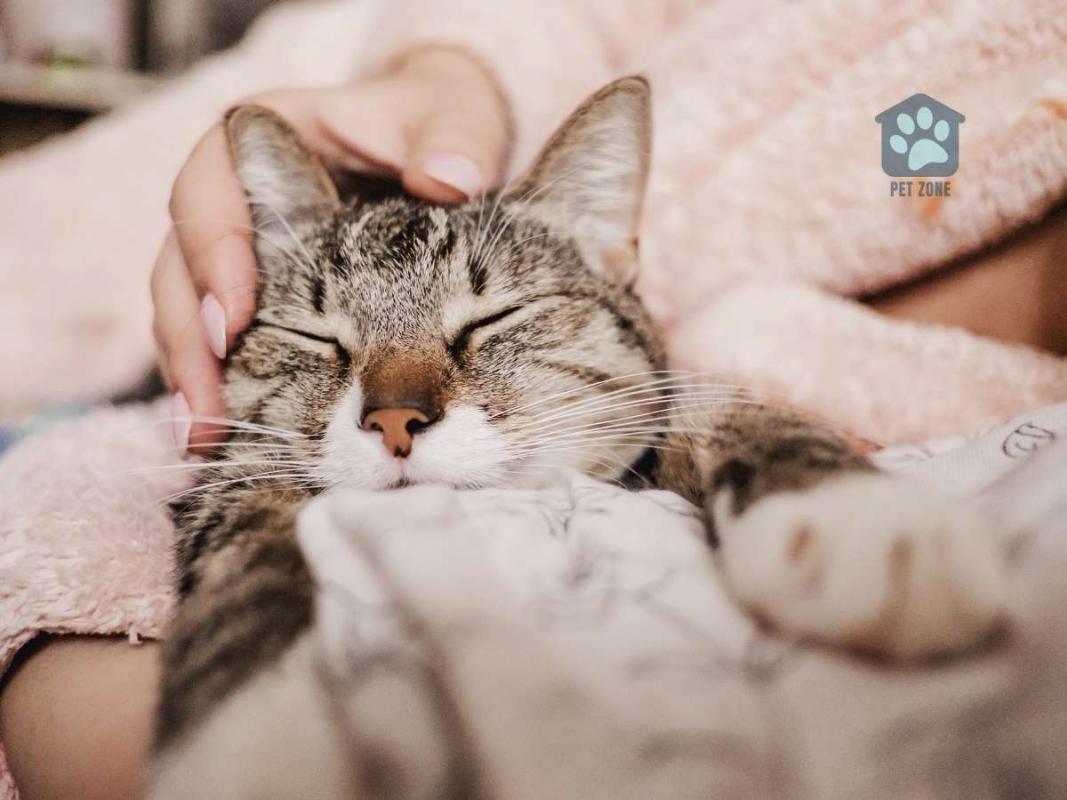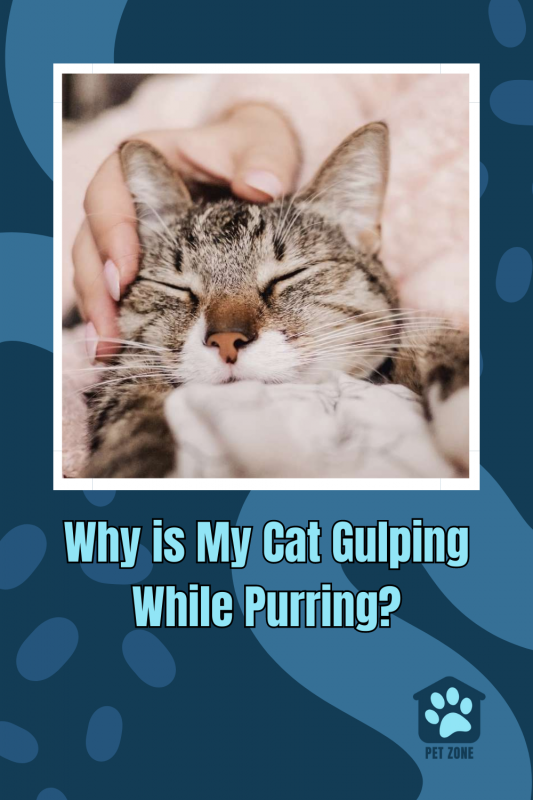Cats are mysterious creatures with unique behaviors that sometimes leave us puzzled. One peculiar behavior that cat owners may encounter is hearing their cat gulp while purring. It’s not a sound you hear every day, and it can be concerning. But why does this happen? In this article, we’ll dive deep into the world of cats and explore the reasons behind this curious phenomenon.
Understanding Purring and Gulping
Every cat owner knows the comforting sound of their cat’s purr. It’s a rhythmic, soothing symphony that signifies contentment, happiness, and affection. But what does it mean when your cat’s purr is occasionally accompanied by a gulp?
The Purr
Contrary to popular belief, cats don’t purr solely out of happiness. They also use purring as a means of communication. It can be a way to seek attention, signal discomfort, or even indicate an underlying ailment. So, while a soft, rhythmic purr might convey contentment, a loud purr could be a plea for attention or a sign of distress.
The Gulping Sound
When you hear your cat gulp while purring, it’s natural to wonder what’s going on. This sound, although not as common as purring, can be attributed to several factors. It might be a result of swallowing excess saliva, ingesting air during intense purring, or even an indicator of health issues.
Reasons Your Cat May Make Gulping Sounds While Purring
There are various reasons why cats gulp while purring. Understanding these reasons can help decipher whether it’s a harmless habit or a cause for concern. Here are some common explanations:
Swallowing Excess Saliva
Cats, like humans, produce saliva. They may experience an increase in saliva production while grooming, especially during shedding seasons or warmer weather. The combination of excessive saliva and purring can lead to swallowing or gulping.
Swallowing Air
Purring is a complex mechanism, and intense purring or prolonged periods of purring can cause cats to involuntarily swallow excess air. This isn’t necessarily related to eating or drinking, but rather a byproduct of the purring itself.
Acid Reflux or GERD
Cats can experience digestive issues, including acid reflux or Gastroesophageal Reflux Disease (GERD). This uncomfortable condition causes stomach contents to flow back into the esophagus, leading to a burning or unsettling feeling. In response to this discomfort, cats may swallow frequently, attempting to alleviate the sensation.
Streptococcal Infection
Bacterial infections, such as Streptococcus, can affect cats, causing inflammation and discomfort in their throats. Cats with streptococcal infections may experience itchiness or irritation, leading them to gulp while purring as a temporary relief.
Thyroid Issues
The thyroid gland plays a crucial role in regulating a cat’s metabolic processes. When the thyroid gland produces an abnormal amount of hormones, it can disrupt the body’s balance. Among the various symptoms, gulping while purring may be attributed to the gland’s influence on swallowing and metabolic functions.
Respiratory Concerns
Like humans, cats can also suffer from upper respiratory infections, such as feline asthma. Cats with asthma may adjust their breathing patterns, leading to sounds like gulping, especially during calming activities like purring.
Other Factors That Make Your Cat Swallow Hard
Apart from the primary reasons discussed above, cats can exhibit unique behaviors based on individual factors. Here are a few more considerations:
Hairballs
Hairballs are a common occurrence among cats. As cats groom themselves, they swallow loose hairs. These hairs can sometimes clump in their stomachs and cause discomfort. Managing or trying to expel a hairball can result in gulping sounds.
Asthma and Allergies
Asthma and allergies can affect cats, just like humans. Asthma attacks in cats can make it challenging for them to breathe, especially when they’re relaxed or purring. Additionally, allergies to certain environmental elements or food can cause similar reactions.
Physical Discomfort
Simple explanations can sometimes be the right ones. If a cat has recently eaten or drunk water quickly, it may gulp or swallow hard to manage the sudden intake. Moreover, if there’s an irritation in their throat, such as a small piece of food or a speck of dust, they may gulp to dislodge it.
Dental or Gum Issues
Dental health is crucial for cats. Issues like gum disease, tooth decay, or oral injuries can cause discomfort, leading to more frequent gulping, especially during activities like purring.
Behavioral Factors
Sometimes, cats display behaviors that aren’t linked to any physical ailment. Gulping might be one such quirk. If other causes have been ruled out, and your cat is in good health according to your veterinarian, it could simply be a unique behavioral trait.
When to Consult Your Vet
As a responsible cat owner, it’s important to pay attention to your cat’s health signals. While occasional gulping while purring may not be a cause for concern, certain signs should prompt a visit to the vet:
Frequency of the Behavior
If your cat consistently makes gulping sounds while purring or even outside of purring sessions, it’s wise to pay closer attention.
Accompanying Symptoms
If gulping is accompanied by other symptoms such as coughing, decreased appetite, lack of energy, or excessive drooling, it may indicate a deeper issue.
Changes in Eating or Drinking Habits
Changes in your cat’s eating or drinking habits, such as eating less, struggling to swallow, excessive water consumption, or avoidance of water altogether, are red flags.
Behavioral Changes
Sudden shifts in behavior, like increased hiding, decreased playfulness, or increased vocalization, especially when combined with gulping, warrant attention.
Age of Your Cat
Kittens and older cats are more vulnerable to certain health issues. Distinguishing between normal behavior and age-related problems is essential.
Prevention and Care: Ensuring Your Cat’s Wellbeing
While you can’t prevent every gulp or hiccup your cat makes, you can take measures to ensure their overall health and comfort. Here are some tips:
Regular Vet Check-ups
Even if your cat appears healthy, regular vet check-ups are essential. They allow for early detection of potential problems and tailored advice based on your cat’s unique needs.
Regular Grooming
Regular grooming, especially for long-haired breeds, helps reduce the chances of hairballs and allows you to check for skin issues or parasites.
Proper Diet
Provide your cat with high-quality cat food and watch for any allergic reactions. Some cats may require specific diets due to health conditions or age.
Hydration
Ensure your cat always has access to fresh water to prevent dehydration and difficulty swallowing.
Safe Environment
Keep harmful substances and toxic plants out of your cat’s reach to prevent potential health issues.
Stress Reduction
Create a calm environment for your cat, offer stimulating toys, and provide safe spaces where they can retreat and relax.
Education
Continuously educate yourself about cat care. Attending workshops, reading articles, or joining cat owner groups can provide valuable insights and enhance your ability to care for your feline friend.
Conclusion
Gulping sounds during purring can be an unexpected interruption to the comforting serenade of your cat’s purr. As we’ve explored, the reasons behind this behavior range from harmless habits to underlying health issues. By being attentive to your cat’s behaviors, understanding their unique quirks, and being proactive in their health care, you can ensure their overall well-being.
However, always consult with your vet if you have concerns about your cat’s health. Your proactive approach, combined with expert advice, will provide your cat with a better quality of life.
Join the Conversation and Spread the Word
We value our readers’ input and experiences. If you’ve observed similar behaviors in your cat or have additional insights, please share them in the comments below. Your contributions enrich our community’s knowledge.
If you found this article helpful or believe it may benefit other cat owners, please consider sharing it on your favorite social media platforms. Together, let’s keep our feline friends healthy and happy!
Feel free to leave your thoughts in the comments below, and if you found this article enlightening, don’t hesitate to share it with your friends on social media!
As an Amazon Associate I earn from qualifying purchases.
Frequently Asked Questions
Q: Why do cats gulp while purring?
A: Cats may gulp while purring due to various reasons, including swallowing excess saliva, ingesting air during intense purring, acid reflux, streptococcal infections, thyroid issues, or respiratory concerns.
Q: When should I be concerned about my cat’s gulping while purring?
A: If your cat frequently makes gulping sounds while purring or if the gulping is accompanied by other symptoms like coughing, decreased appetite, lack of energy, or behavioral changes, it’s best to consult a veterinarian.
Q: How can I prevent my cat from gulping while purring?
A: While you can’t prevent every instance of gulping, maintaining regular vet check-ups, grooming your cat regularly, providing a proper diet, ensuring hydration, creating a safe environment, reducing stress, and educating yourself about cat care can contribute to your cat’s overall well-being.
Q: Can gulping while purring be a sign of a serious health issue?
A: In some cases, gulping while purring can be a symptom of underlying health issues. If you have concerns about your cat’s health, it’s always best to consult with a veterinarian for a proper diagnosis and treatment.

